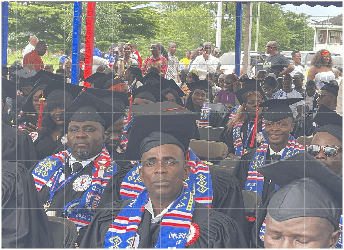By Grace Q. Bryant
The Commandant General of the Nigeria Security and Civil Defense Corps, Ahmed Abubakar Audi, has highlighted significant challenges facing African universities that threaten the quality of higher education and research across the continent.
Speaking on September 16, 2024 at the 104th Commencement Convocation of the University of Liberia, held at the Fendell Campus in Montserrado County, General Audi emphasized the chronic lack of resources and funding that hampers many institutions.
Over 334 students graduated from the University of Liberia, representing various fields within the Amos C. Sawyer College of Social Sciences and Humanities, the Williams V.S. Tubman College of Education, and the College of Gender Studies and Interdisciplinary Research.
During his keynote address, General Audi, who is based in Nigeria, identified limited funding as one of the most pressing issues, stating that it severely affects universities’ ability to provide quality education and maintain the infrastructure necessary for research and outreach.
“This deficiency hampers their ability to provide quality education and maintain the infrastructure necessary for research and community outreach,” he remarked.
According to General Audi, many African universities operate on inadequate budgets, which limit their capacity to invest in critical areas like educational resources, research initiatives, and campus facilities.
“Libraries, laboratories, and lecture halls are often underfunded, which impacts the quality of education students receive. In many cases, universities struggle to maintain even basic facilities, creating a less conducive environment for learning and research,” he explained.
The speaker also highlighted how these resource limitations extend to staffing, making it difficult for African universities to attract and retain qualified academics due to uncompetitive salaries.
“The issue of brain drain is particularly significant, as talented professors and researchers migrate to institutions abroad that offer better compensations and working conditions,” he stated.
General Audi added, “This migration of talent exacerbates the challenges African universities face in building capacity, as institutions lose the very individuals necessary to improve academic programs and promote research growth.”
He stressed that brain drain not only weakens the academic staff pool, but also creates a shortage of experts essential for training the next generation of professionals. This leads to a cycle of dependency on foreign institutions and limits Africa’s ability to establish sustainable educational systems.
To address these challenges, General Audi called for increased investment from African governments and international partners. He emphasized the need for policies that improve salaries and working conditions for academic staff.
“Strengthening local research and innovation capacity is key to mitigating the effects of brain drain and ensuring that African universities can contribute meaningfully to global knowledge production while addressing the needs of their communities,” he said.
General Audi also noted the long-standing issue of professionals leaving Africa for better opportunities elsewhere, resulting in a loss of intellectual capital and expertise that could have contributed to development across the continent.
“This phenomenon not only reduces the talent pool available to universities but also hinders the development of local capacity to address Africa’s challenges,” he stressed.
To combat these issues, he recommended that universities focus on building their capacity and creating environments that encourage skilled individuals to remain in their home countries and institutions.
He further urged governments and international organizations to increase funding for African universities to enhance infrastructure, support research, and provide scholarships for students in fields such as peace studies and similar programs.
General Audi also recommended that universities develop programs aimed at building the capacity of their staff and students, including professional development opportunities and initiatives to retain skilled academics. He stressed the importance of creating incentives to prevent brain drain and ensure academics remain in Africa.
“Governments should respect the academic freedom of universities and avoid interference in their operations. Universities must be free to conduct research and engage in discussions on sensitive topics without fear of censorship or political repression,” he maintained.
He also advocated for universities to adopt inclusive policies that celebrate cultural and linguistic diversities, including offering courses in multiple languages, promoting intercultural dialogue, and fostering a culture of respect and understanding on campus.
Finally, General Audi encouraged African universities to strengthen partnerships and collaborations with other institutions, both within and outside the continent. “Such partnerships can boost the capacity of African universities to contribute to peace-building efforts while fostering knowledge sharing and joint initiatives,” he concluded.
Dean Josephus Gray emphasized that graduates have been taught to respect others’ ideas, embrace diversity, and approach the unknown with an open mind.
“The key to personal growth lies in having clear goals and a willingness to help others,” he said.
He reminded the graduates that their accomplishments are a collective achievement made possible by the support of parents, family, and friends.
He also encouraged them to serve as ambassadors, listening more and speaking less, and to approach challenging situations with peace, not violence, so that future generations may follow their examples.
Dean Gray expressed his gratitude to the faculty and extended special thanks to the former president of the University of Liberia, Julius Julukon Sarwolo Nelson for his ongoing support of ACS College.
“Graduates, we bid you farewell and thank you for your contributions. You are our finest ambassadors,” he said.
He concluded with a passage from Exodus 14:14: “Be at peace; the Lord will fight for you.”
Sign in
Sign in
Recover your password.
A password will be e-mailed to you.


